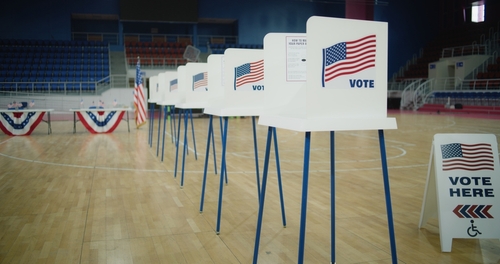At a Glance
- U.S. intelligence warns of insider threats to election integrity
- “Election deniers” in key positions raise concerns for Dems
- Cybercriminal threats and AI-generated disinformation pose new challenges
- Partisan differences in views on election threats could lead to contested results
- Foreign interference from Russia, China, and Iran expected
Insider Threats: A Growing Concern
The integrity of U.S. elections faces an unprecedented threat from within. A recent U.S. intelligence memo has sounded the alarm on potential insider threats that could undermine the fairness and transparency of the electoral process. With election deniers and MAGA loyalists now occupying strategic positions, there’s a heightened risk of unauthorized ballot handling and unusual access to voting systems.
Colorado’s Division of Homeland Security and Emergencies Management director Kevin Klein confirmed the gravity of the situation, stating, “The entire threat picture is elevated for this election. I think it’s fair to say that insider threats are a greater concern than in previous elections.”
This assessment underscores the urgent need for heightened vigilance and robust safeguards to protect the democratic process.
The Trump Factor
Former President Donald Trump continues to cast a long shadow over the electoral landscape. His Democrat critics claim that his persistent claims of a “rigged” system, and his assertions that he can only lose due to “massive fraud,” have eroded public trust in the election process. But millions of Americans have lost faith in the integrity of the electoral system quite aside from Trump’s opinions.
The case of Colorado Clerk Tina Peters, who was convicted on multiple charges for allowing unauthorized access to election equipment, serves as a stark reminder of the potential for insider threats. As Dan Rubinstein pointed out, “She was elected specifically to be the safeguard and then became the threat by sneaking people into the room with machines who weren’t supposed to be in there, filming the passwords that she wasn’t supposed to have access to, passing them on to other people.”
Cybersecurity and Foreign Interference
While insider threats loom large, the specter of foreign interference and cybercriminal activities adds another layer of complexity to election security. Russia, China, and Iran are expected to attempt to influence the election, each with its own motivations and methods. The Office of Director of National Intelligence has established the Foreign Malign Influence Center to monitor these threats, but the challenge remains formidable.
Cybercriminal threats, particularly ransomware attacks, are now considered more significant than those from rival nations. The Cybersecurity and Infrastructure Security Agency (CISA) has a dedicated program to support state and local governments in protecting election assets, but the evolving nature of these threats requires constant vigilance and adaptation.
The AI Wild Card
As if the existing threats weren’t enough, the rise of AI-generated disinformation presents a new and potentially game-changing challenge to election integrity. The ability to create convincing deep fakes and spread false information at scale could severely impact public perception and trust in the electoral process.
This technological threat compounds the already significant challenges posed by partisan divides and differing views on election threats. As political scientist Steven Smith warns, “This could get ugly. Just how ugly is likely to be determined by the quality of election administration and the rhetoric of political leaders.”
A Nation Divided
The stark partisan divide in perceptions of election threats further complicates the situation. Trump supporters are primarily concerned about fraud in mail-in voting, with nine out of 10 expressing concern. In contrast, Biden supporters are more worried about foreign intervention, with nearly nine out of 10 voicing their apprehension. These divergent views could lead to significant issues if the election results are close or contested.
Political scientist Steven Smith said voters left and right are concerned about election integrity, but for different reasons. “Apart from voters’ decisions, the legitimacy of American elections is at stake,” Smith said. “If the election eve results are close, differences in pre-election attitudes about the threats to election integrity, shaped as they are by partisan preferences, may cast a dark cloud over the outcome in the minds of many Americans.”
As we approach the 2024 election, the challenges to maintaining a fair and transparent electoral process are manifold and complex. From insider threats and foreign interference to cybercriminal activities and AI-generated disinformation, the integrity of our democratic institutions faces unprecedented tests.

